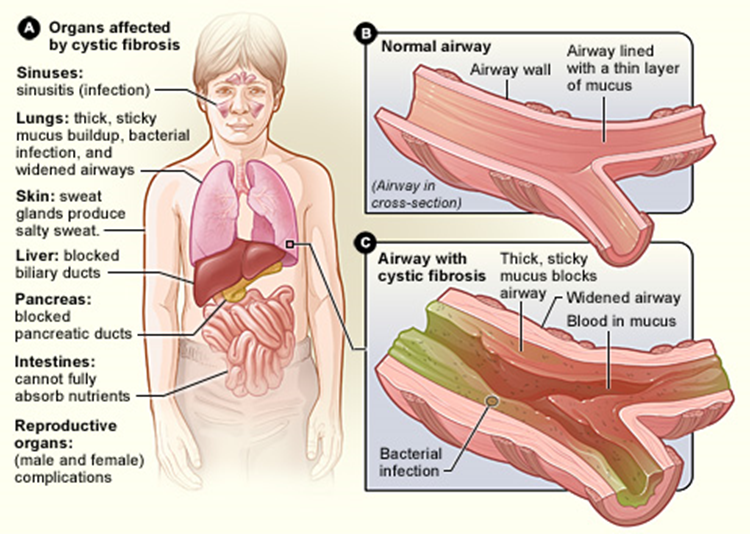The parents of a child, who has had multiple respiratory infections since birth tells the nurse, "when we kiss our child, all we can taste is salt". It would be appropriate for the nurse to suggest to the primary health-care provider that the child be assess for which of the following illnesses?
Bronchiolitis
Pharyngitis
Asthma
Cystic Fibrosis
The Correct Answer is D
A. Bronchiolitis:
Bronchiolitis is typically characterized by inflammation of the bronchioles, causing symptoms such as wheezing and respiratory distress. However, the symptom of tasting salt on the skin is not directly associated with bronchiolitis.
B. Pharyngitis:
Pharyngitis, or inflammation of the throat, may cause symptoms like a sore throat, but it is not typically associated with a salty taste on the skin.
C. Asthma:
Asthma is a chronic condition characterized by airway inflammation and bronchoconstriction. While it can cause respiratory symptoms, it is not specifically associated with a salty taste on the skin.
D. Cystic Fibrosis:
Cystic Fibrosis is a genetic disorder that affects the respiratory, digestive, and reproductive systems. It often leads to salty-tasting skin due to increased salt content in sweat. The presence of a salty taste on the skin can be a significant indicator of cystic fibrosis.

Nursing Test Bank
Naxlex Comprehensive Predictor Exams
Related Questions
Correct Answer is ["46"]
Explanation
To provide adequate hydration for a toddler with dehydration, the nurse needs to calculate the daily fluid requirements based on the child's weight and then divide it by 24 hours to get the hourly rate.
For a 12 kg toddler, the daily fluid requirement is 1000 ml for the first 10 kg plus 50 ml for each additional kg, which equals 1100 ml.
Therefore, the hourly rate is 1100 ml / 24 hours, which is about 46 ml.
The nurse would set the pump at 46 ml per hour.
Correct Answer is A
Explanation
A. 21 pounds: This is the correct answer. The general guideline is that infants tend to triple their birth weight by the age of 12 months. If the infant weighed 7 pounds at birth, tripling that weight would be 21 pounds.
B. 14 pounds: This weight would not be consistent with the expected weight gain of a healthy infant by 12 months. It's too low based on the tripling guideline.
C. 25 pounds: This weight would be higher than expected based on the tripling guideline. It's not a typical weight for a healthy 12-month-old who had a birth weight of 7 pounds.
D. 10 pounds: This weight would be lower than the expected weight gain. A 12-month-old who started at 7 pounds should have gained more weight by this age.
Whether you are a student looking to ace your exams or a practicing nurse seeking to enhance your expertise , our nursing education contents will empower you with the confidence and competence to make a difference in the lives of patients and become a respected leader in the healthcare field.
Visit Naxlex, invest in your future and unlock endless possibilities with our unparalleled nursing education contents today
Report Wrong Answer on the Current Question
Do you disagree with the answer? If yes, what is your expected answer? Explain.
Kindly be descriptive with the issue you are facing.
